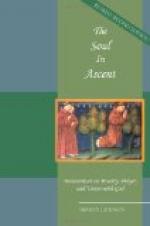We live in the midst of mystery. In the future we shall probably find that our best attempts at rational answers to many questions have gone wide of the mark. The most that any of us can do is to be true to ourselves, and to respond to every call from above. In the midst of the gloom of mortal existence it is safe to follow our hearts.
We long to commune with those who have gone, to help them and to be helped by them. This longing is natural and rational. That it is not without reason is proved by the example of our Master, who, after His death, is represented as ministering to those whom He loved, and who, we are told, ever liveth to make intercession for us.
What our hearts desire, what harmonizes with reason, what is confirmed by the revelations and example of our divine Teacher, will persuade none far from the path which leads to light and felicity.
Those whom men call dead, it is best to believe, have but entered upon another phase of the eternal life of the spirit.
The Roman Church has an act or service called “The Culture of the Dead.” It means the “practice of the presence” of those who, though gone from us, in spirit are with us. The Creed has an article which reads, “I believe in the communion of saints.” The Christian year has one day called “All Saints’ Day.” We shall not be far from the traditions of the church when we pray for our beloved, whether they be in the body or out of the body.
Those who would realize the beatitude of this privilege should remember the truth in this stanza from “In Memoriam:”
“How pure at heart and
sound in head,
With what
Divine affections bold,
Should be
the man whose thought would hold
An hour’s communion
with the dead.”
THE GOAL
But Thee, but Thee, O Sovereign
Seer of time,
But Thee, O poet’s Poet,
Wisdom’s Tongue,
But Thee, O man’s best
Man, O love’s best Love,
O perfect life in perfect
labor writ,
O all men’s Comrade,
Servant, King, or Priest,—
What if or yet,
what mole, what flaw, what lapse,
What least defect or shadow
of defect,
What rumor, tattled by an
enemy,
Of inference loose, what lack
of grace
Even in torture’s grasp,
or sleep’s, or death’s,—
Oh, what amiss may I forgive
in Thee,
Jesus, good Paragon, thou
Crystal Christ?
—The Crystal. Sidney Lanier.
XII
THE GOAL




